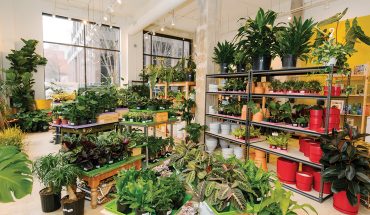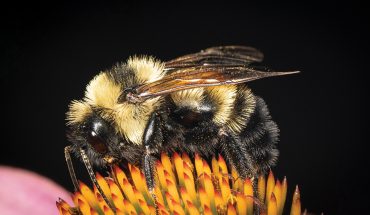This Kirby Street couple’s lush garden is full of native and edible plants, a testament that humans and nature can exist harmoniously.
by Jessie Ammons Rumbley | photography by Liz Condo
Around a hairpin turn in the Kirby-Bilyeu neighborhood sits a charming white house with teal-and-blue trim—but what you’ll notice first is the yard. Overflowing with greenery, there’s hardly any grass in sight. Instead, there are fruit and nut trees (chestnuts, pecan, fig, persimmon), grape vines, flowers, herbs and a massive vegetable garden. It’s just one-third of an acre, but the plot provides everything Will Hooker and Jeana Myers’ family needs, as well as plenty to share. “For most of the year, we have a salad every night from the garden,” Hooker says.
Their yard is an urban homestead that has inspired a community far beyond Raleigh. Hooker is something of a guru in the field of permaculture, a sustainable design philosophy that originated in Australia in the 1970s. The retired North Carolina State University professor was teaching landscape architecture in the early 1990s when he took a year-long sabbatical, biked across the nation, and returned more passionate about sustainability than ever before. “The thing that struck me was that, as I bicycled everywhere, I didn’t see anybody out on the land,” Hooker says. “It concerned me because no one was paying attention.”
Meanwhile, Hooker and his wife, Wake County Horticulture Extension Agent Jeana Myers, had just bought their Kirby Street house and started a small garden. Soon after, he earned his Permaculture Design Certificate and returned to the classroom, infusing ecological design courses with permaculture principles. But these are put-your-money-where-your-mouth-is principles, and Hooker needed his students to see them in action. So he and Myers designed their garden as a model. “When it was put together, it was put together for my students,” Hooker says.
Now, more than 25 years later, it’s a celebrated example of the abundance that can come from, as Hooker says, “the revolution of common sense.” That, and passion—while Hooker did most of the design, it’s Myers who keeps the garden humming, devoting 10 or more hours each week. “It’s Jeana’s passion,” Hooker says. “My mission is to bring good design to permaculture. She keeps it going.”
A cornerstone of permaculture is the interdependence of plants, animals and natural forces like water, rain and sunlight. The idea is to think sensibly about every single plant and structure to maximize efficiency: use vining plants for shade cover and weave them into fences, collect water for irrigation, compost. “It’s an umbrella of thinking that deals with all aspects of living,” Hooker says. In this year of upheaval, the garden has flourished—a steady, calming comfort and apt reminder of the comforts of the land. The couple have long loved their close-knit neighborhood and Raleigh community and kept their garden gates open for both, hosting impromptu happy hours on the patio and, years ago, when the neighborhood children were younger, firing pizzas in an outdoor oven built by Hooker’s students. With their children grown and careers winding down, Hooker and Myers are pondering their next project, scaling down the garden, which will take many years. But they won’t go anywhere. And for now, they’re relishing the time to slow down and pay attention—right in their own backyard.

Persimmon trees greet visitors near the garden’s entrance. “This is one of our favorite trees,” says Myers. “They’re low maintenance and fruit comes at the end of October.” Elderberry and chestnut are among the other trees, and muscadine grapes create an arbor on the deck. “We’re too close to the road to have a roof, so we get shade from the vine,” Hooker explains. “It’s combining functions: the grapevine is shade and we have food from it. We harvest a ton of grapes.”

Another example of permaculture design, Hooker and Myers’ muscadine vine on their front porch, creates a living arbor. Hooker says by stacking functions with design, this one vine provides beauty, food and shade.

Cleome, commonly known as Spider Flowers, bloom alongside Black-eyed Susan and variety of vegetable plants in the garden of Will Hooker and Dr. Jeana Myers.

Much of Myers and Hooker’s yard is what landscape architects call “edible landscape,” full of native fruit, vegetable, herb and nut species. For many years, they also raised chickens, but have phased them out as they’ve started to downsize. “Permaculture recommends that you have an animal in the cycle,” says Myers. “They were integral for a long time.” Besides providing eggs, the chickens were fed vegetable compost and ate pests, and their waste became fertilizer. “It’s this wonderful cycle.”










